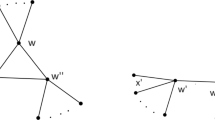Abstract
The linear complexity and the \(k\)-error linear complexity of a sequence have been used as important security measures for key stream sequence strength in linear feedback shift register design. By using the sieve method of combinatorics, we investigate the \(k\)-error linear complexity distribution of \(2^n\)-periodic binary sequences in this paper based on Games–Chan algorithm. First, for \(k=2,3\), the complete counting functions for the \(k\)-error linear complexity of \(2^n\)-periodic binary sequences (with linear complexity less than \(2^n\)) are characterized. Second, for \(k=3,4\), the complete counting functions for the \(k\)-error linear complexity of \(2^n\)-periodic binary sequences with linear complexity \(2^n\) are presented. Third, as a consequence of these results, the counting functions for the number of \(2^n\)-periodic binary sequences with the \(k\)-error linear complexity for \(k = 2\) and \(3\) are obtained.
Similar content being viewed by others
References
Ding C.S., Xiao G.Z., Shan W.J.: The Stability Theory of Stream Ciphers[M]. Lecture Notes in Computer Science, vol. 561, pp. 85–88. Springer, Berlin (1991).
Games R.A., Chan A.H.: A fast algorithm for determining the complexity of a binary sequence with period \(2^n\). IEEE Trans. Inf. Theory 29(1), 144–146 (1983).
Fu F., Niederreiter H., Su, M.: The characterization of \(2^n\)-periodic binary sequences with fixed 1-error linear complexity. In: Gong G., Helleseth T., Song H.-Y., Yang K. (eds.) SETA 2006, Lecture Notes in Computer Science, vol. 4086, pp. 88–103. Springer, Berlin (2006).
Kavuluru R.: \(2^n\)-periodic binary sequences with fixed 2-error or 3-error linear complexity. In: Golomb S., Parker M., Pott A., Winterhof A. (eds.) SETA 2008. Lecture Notes in Computer Science, vol. 5203, pp. 252–265. Springer, Berlin (2008).
Kavuluru R.: Characterization of \(2^n\)-periodic binary sequences with fixed 2-error or 3-error linear complexity. Des. Codes Cryptogr. 53, 75–97 (2009).
Kurosawa K., Sato F., Sakata T., Kishimoto W.: A relationship between linear complexity and \(k\)-error linear complexity. IEEE Trans. Inf. Theory 46(2), 694–698 (2000).
Meidl W.: On the stablity of \(2^{n}\)-periodic binary sequences. IEEE Trans. Inf. Theory 51(3), 1151–1155 (2005).
Rueppel, R.A.: Analysis and Design of Stream Ciphers (chap. 4). Springer, Berlin (1986).
Stamp M., Martin C.F.: An algorithm for the \(k\)-error linear complexity of binary sequences with period \(2^{n}\). IEEE Trans. Inf. Theory 39, 1398–1401 (1993).
Zhou J.Q.: A counterexample concerning the 3-error linear complexity of \(2^n\)-periodic binary sequences. Des. Codes Cryptogr. 64(3), 285–286 (2012).
Zhu F.X., Qi W.F.: The 2-error linear complexity of \(2^n\)-periodic binary sequences with linear complexity \(2^n\)-1. J. Electron. (China) 24(3), 390–395 (2007).
Acknowledgments
The research was supported by Anhui Natural Science Foundation (No.1208085MF106).
Author information
Authors and Affiliations
Corresponding author
Additional information
Communicated by T. Etzion.
Rights and permissions
About this article
Cite this article
Zhou, J., Liu, W. The \(k\)-error linear complexity distribution for \(2^n\)-periodic binary sequences. Des. Codes Cryptogr. 73, 55–75 (2014). https://doi.org/10.1007/s10623-013-9805-8
Received:
Revised:
Accepted:
Published:
Issue Date:
DOI: https://doi.org/10.1007/s10623-013-9805-8
Keywords
- Periodic sequence
- Linear complexity
- \(k\)-error linear complexity
- \(k\)-error linear complexity distribution




